
Georg Ludwig Ritter von Trapp was an officer in the Austro-Hungarian Navy who became the patriarch of the Trapp Family Singers.

Josef Meinrad was an Austrian actor. From 1959 until his death in 1996, Meinrad held the Republic of Austria's Iffland-Ring, which passes from actor to actor — each bequeathing the ring to the next holder, judging that actor to be the "most significant and most worthy actor of the German-speaking theatre".

Maria Augusta von Trapp DHS, often styled as “Baroness”, was the stepmother and matriarch of the Trapp Family Singers. She wrote The Story of the Trapp Family Singers, which was published in 1949 and was the inspiration for the 1956 West German film The Trapp Family, which in turn inspired the 1959 Broadway musical The Sound of Music and its 1965 film version.

Horst Tappert was a German film and television actor best known for the role of Inspector Stephan Derrick in the television drama Derrick.

The Trapp Family was a singing group formed from the family of former Austrian naval commander Georg von Trapp. The family achieved fame in their original singing career in their native Austria during the interwar period. They also performed in the United States before emigrating there permanently to escape the deteriorating situation in Austria leading up to World War II. In the United States, they became well known as the "Trapp Family Singers" until they ceased to perform as a unit in 1957. The family's story later served as the basis for a memoir, two German films, and the Rodgers and Hammerstein Broadway musical The Sound of Music. The last surviving of the original seven, Maria Franziska, died in 2014 at the age of 99. The youngest and last surviving member of the Trapp Family Singers is Johannes von Trapp.
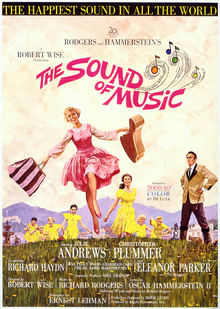
The Sound of Music is a 1965 American musical drama film produced and directed by Robert Wise from a screenplay written by Ernest Lehman, and starring Julie Andrews and Christopher Plummer, with Richard Haydn, Peggy Wood, Charmian Carr, and Eleanor Parker. The film is an adaptation of the 1959 stage musical composed by Richard Rodgers, with lyrics by Oscar Hammerstein II and a book by Lindsay and Crouse. It is based on the 1949 memoir The Story of the Trapp Family Singers by Maria von Trapp and is set in Salzburg, Austria. It is a fictional retelling of her experiences as governess to seven children, her eventual marriage with their father Captain Georg von Trapp, and their escape during the Anschluss in 1938.
Austrian Americans are Americans of Austrian descent, chiefly German-speaking Catholics and Jews. According to the 2000 U.S. census, there were 735,128 Americans of full or partial Austrian descent, accounting for 0.3% of the population. The states with the largest Austrian American populations are New York (93,083), California (84,959), Pennsylvania (58,002), Florida (54,214), New Jersey (45,154), and Ohio (27,017).
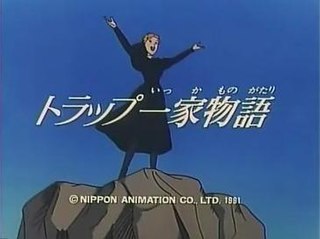
Trapp Family Story is a 1991 Japanese animated series by Nippon Animation, based on the story of the real-life Austrian singing family the Trapp Family. It is a part of the World Masterpiece Theatre franchise, which adapted classic works of literature into animated TV shows. 40 episodes aired on Fuji TV.
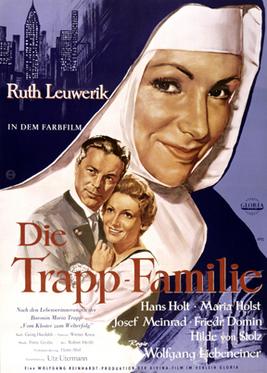
The Trapp Family is a 1956 West German comedy drama film about the real-life Austrian musical family of that name directed by Wolfgang Liebeneiner and starring Ruth Leuwerik, Hans Holt, and Maria Holst. Based on Maria von Trapp's 1949 memoir, The Story of the Trapp Family Singers, the film is about a novice nun sent to care for the unruly children of a wealthy baron, who falls in love with and marries the young woman. Through her caring influence, the family becomes a famous singing group. When the baron is pressured to join Hitler's navy, the family escapes to the United States, where they establish themselves as singers.
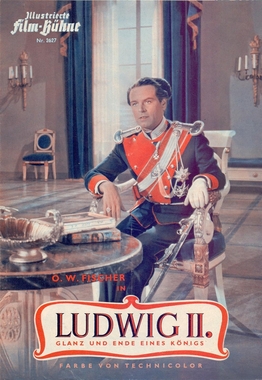
Ludwig II is a 1955 West German historical drama film directed by Helmut Käutner and starring O.W. Fischer, Ruth Leuwerik and Marianne Koch. It is based on the life of the nineteenth century ruler Ludwig II of Bavaria. It was entered into the 1955 Cannes Film Festival. The film was shot in technicolor at the Bavaria Studios in Munich with sets designed by the art director Hein Heckroth and Fritz Lück. Location shooting took place at the historic residences of Ludwig II Herrenchiemsee, Neuschwanstein Castle and Hohenschwangau Castle.

Ruth Leuwerik was a German film actress, one of the most popular stars of German film during the 1950s. She appeared in 34 films between 1950 and 1977. Leuwerik is probably best known for her portrayal of Maria von Trapp in the films The Trapp Family and The Trapp Family in America.
Ursula Dirichs was a German actress.
Hans Holt was an Austrian film actor. He appeared in more than 100 films between 1935 and 1990.
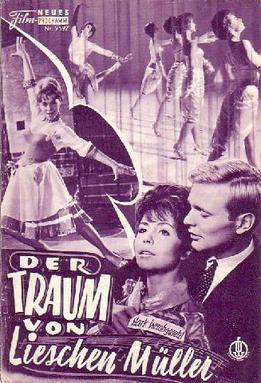
The Dream of Lieschen Mueller is a 1961 West German musical comedy film directed by Helmut Käutner and starring Sonja Ziemann, Martin Held and Cornelia Froboess.
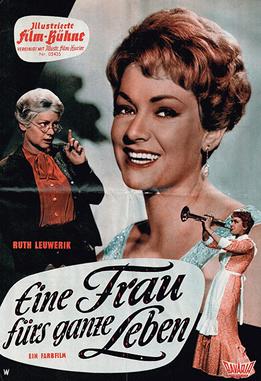
A Woman for Life is a 1960 West German musical comedy film directed by Wolfgang Liebeneiner and starring Ruth Leuwerik, Klausjürgen Wussow, and Harry Meyen.
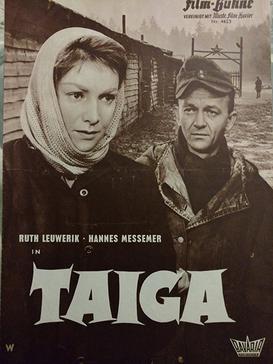
Taiga is a 1958 West German drama film directed by Wolfgang Liebeneiner and starring Ruth Leuwerik, Hannes Messemer and Günter Pfitzmann.

When a Woman Loves is a 1950 West German comedy film directed by Wolfgang Liebeneiner and starring Hilde Krahl, Johannes Heesters and Mathias Wieman. It is based on the play Don't Promise Me Anything by Charlotte Rissmann, which Liebeneiner had previously made into a 1937 film of the same title.
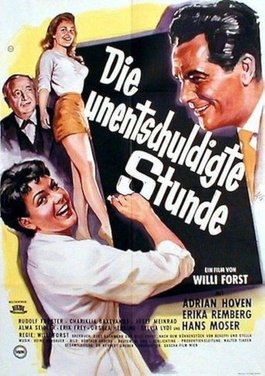
The Unexcused Hour is a 1957 Austrian-West German comedy film directed by Willi Forst and starring Adrian Hoven, Erika Remberg and Hans Moser. It is a remake of the 1937 film of the same title. It was shot at the Sievering Studios in Vienna. The film's sets were designed by the art directors Karl-Hermann Joksch, Isabella Schlichting and Werner Schlichting.















